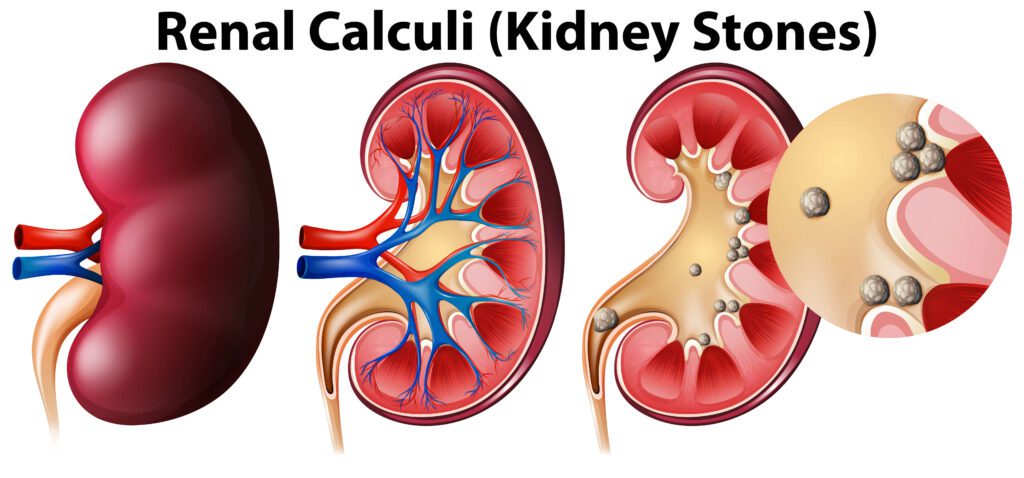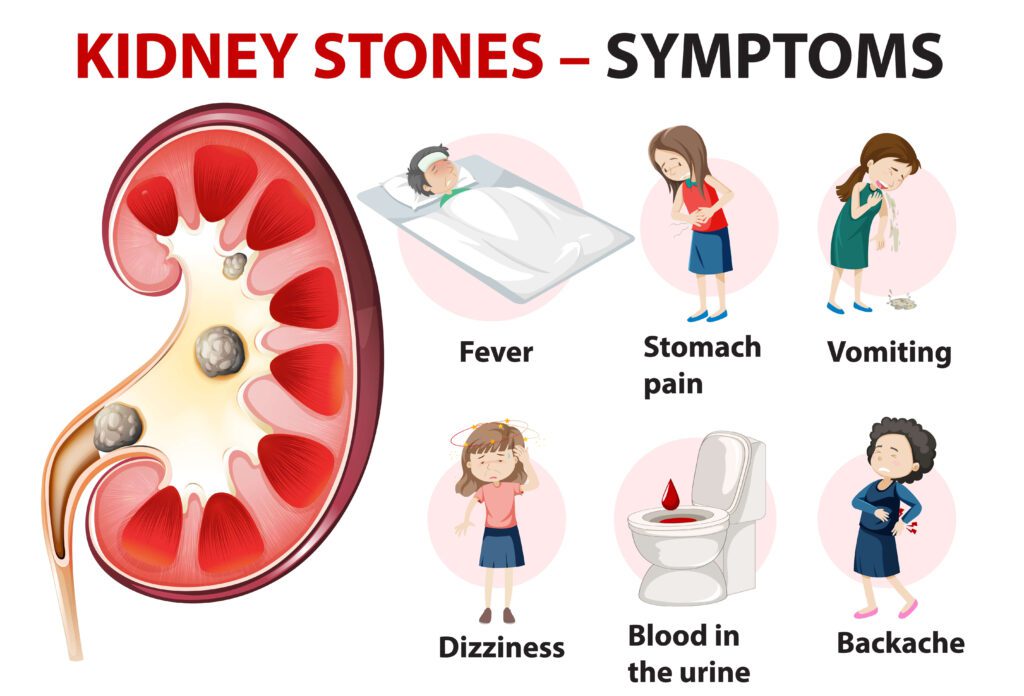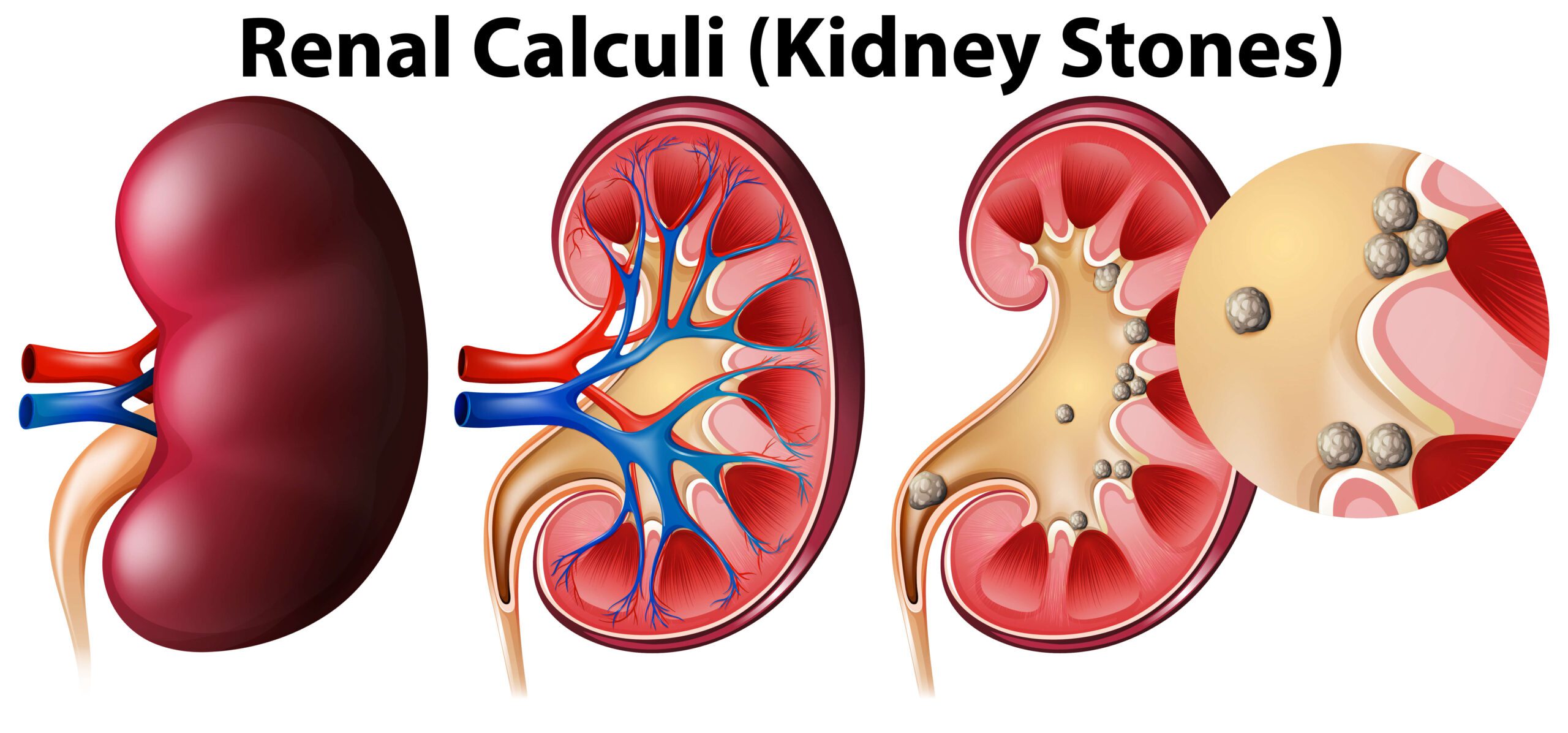INTRODUCTION
Any disorder that impairs your kidneys’ ability to function is referred to as a renal disease. Your kidneys are critical organs that filter waste from your blood, control the fluid balance in your body, and produce vital hormones, all of which are essential for maintaining your general health. Kidney illness comes in various forms, including its causes, signs, and treatments. Chronic renal disease and acute kidney damage are two frequent kinds of kidney disease.
HOW DOES A KIDNEY FUNCTION?
Your kidneys are two bean-shaped organs on either side of your spine that filter waste products and extra fluid from your blood, regulate your body’s fluid levels, and produce hormones that help control blood pressure, the production of red blood cells, and the health of your bones. To understand how your kidneys work, first understand their basic anatomy.

A tubule connecting to a collecting duct and a tiny glomerulus filter make up each nephron. Waste materials, extra fluid, and some necessary nutrients are filtered out of the blood as it travels through the glomerulus and is collected in the tubule. The renal pelvis, which resembles a funnel and is where urine is gathered before being sent through the ureter and bladder, is reached by the collecting ducts. Urination causes the urine to leave the body from there.
Your kidneys filter waste materials and extra fluid, but they also play a critical function in controlling the fluid balance in your body. They accomplish this by modifying how much water and electrolytes are reabsorbed into the bloodstream or eliminated in the urine. Your body has to have a stable balance of fluids and electrolytes for your cells to operate correctly.
SIGNS & SYMPTOMS

Kidney illness comes in various forms, each with its signs. like as
1. Urination pattern changes: Urination pattern changes are one of the earliest indicators of renal disease.
2. Fatigue and weakness: You can have more significant fatigue and weakness than usual when kidney function deteriorates.
3. Swelling: You may experience swelling in your hands, feet, ankles, or face as your kidneys cannot remove extra fluid from your blood.
4. Shortness of breath: Fluid accumulation in the lungs brought on by kidney disease might make it challenging to breathe or catch your breath.
5. High blood pressure: Your kidneys are crucial in controlling blood pressure; therefore, your blood pressure may increase if they are not working correctly.
6. Nausea and vomiting: You may have nausea, vomiting, and general malaise as waste materials accumulate in your blood.
7. Itching and dry skin: Kidney disease can result in a buildup of minerals and waste products in your blood, leaving your skin dry and itchy.
HOW DOES IT CAUSE?
A variety of circumstances can cause the onset of renal disease. Among the most frequent causes are:
1. Diabetes: Kidney disease is primarily brought on by diabetes. The kidneys’ tiny blood arteries may become damaged by high blood sugar levels, making them less efficient at removing waste and extra fluid from circulation.
2. High blood pressure: High blood pressure can also harm the kidney’s blood arteries, making it harder for the organs to perform as intended.
3. Family history: You may be more likely to develop kidney disease if you have a history of the ailment in your family.
4. Aging: As you age, your kidneys may lose their capacity to remove waste and extra fluid from your blood, raising your risk of renal disease.
5. Smoking: Smoking can harm your kidneys’ blood arteries, making it more difficult for them to perform as they should.
6. Obesity: Obesity increases the risk of developing renal disease, among other illnesses.
7. Specific Medications: If used in large dosages or for an extended time, some pharmaceuticals, such as nonsteroidal anti-inflammatory drugs (NSAIDs), might harm your kidneys.
8. Kidney stones: If kidney stones obstruct the passage of urine for a long time, they may harm your kidneys.
9. Infections: If left untreated, urinary system infections or other body regions can occasionally result in kidney damage.
STAGES OF KIDNEY DISEASE
The glomerular filtration rate (GFR), a test that gauges how well your kidneys work, is the foundation for the phases. Here is a description of each phase:
Stage 1: During this phase, your GFR is normal or almost daily, but you may still notice early kidney damage symptoms, such as protein in the urine. Even though you might not be experiencing any symptoms at this point, it’s crucial to monitor your kidney function and take care of any underlying medical issues that could be causing kidney damage.
Stage 2: Your GFR is slightly lower in this stage, which shows that your kidneys aren’t working as well as they should. Symptoms like weariness, altered urine patterns, and swelling in the hands and feet could start to appear.
Stage 3: Your GFR is much lower in stage 3, which denotes moderate kidney injury. More severe symptoms include high blood pressure, anaemia, bone damage, and an elevated risk of infections could appear.
Stage 4: Your GFR is significantly lowered at this point, which indicates advanced kidney injury. You might feel nausea, vomiting, itching, and muscle cramps.
Stage 5: The most advanced stage of kidney disease is an end-stage renal disease (ESRD). Your GFR is extremely low, and your kidneys can no longer perform their fundamental duties.
WHAT IS THE CURE/TREATMENT?
Here are a few typical kidney disease treatments:
1. Medications: High blood pressure, anaemia, and other symptoms of renal disease are frequently treated with medications.
2. Dialysis: When your kidneys cannot filter waste and extra fluid from your blood on their own, dialysis is a treatment that uses a machine to do so.
3. Kidney transplant: A healthy kidney from a donor is surgically put into your body to replace your damaged kidneys.
4. Lifestyle modifications: A few can help control symptoms and halt the course of renal disease.
5. Alternative treatments: Some kidney disease sufferers may get relief from alternative treatments like acupuncture or herbal cures.
6. Sirolimus (also known as rapamycin) is a medication that can be considered for the treatment of kidney diseases. It is an immunosuppressant drug that is commonly used in kidney transplantation to prevent rejection of the transplanted organ.
Sirolimus has also been studied for the treatment of other kidney diseases, such as polycystic kidney disease and focal segmental glomerulosclerosis (FSGS). However, its use in these conditions is still being studied and may depend on individual patient factors.
It is important to discuss the potential benefits and risks of sirolimus with a healthcare provider before starting treatment.
COMPLICATIONS
As the kidneys are essential for filtering waste and controlling vital internal processes, kidney illness can result in various issues throughout the body. The following are some of the most typical kidney disease complications:
1. Cardiovascular disease is the first condition that kidney disease can raise your risk of, including heart attacks and strokes.
2. Anemia: The hormone erythropoietin, produced by the kidneys, promotes the creation of red blood cells.
3. Bone disease: The kidneys control the body’s calcium and phosphorus levels.
4. Nerve damage: Kidney illness can cause nerve damage throughout the body, resulting in muscle weakness and tingling symptoms.
5. Fluid accumulation: Kidney disease may cause the kidneys to be unable to adequately eliminate extra fluid from the body, which can cause fluid to accumulate in the lungs, legs, and other parts of the body.
6. Infections: Kidney failure can impair your immune system, which increases your risk of contracting infections like pneumonia and urinary tract infections.
MYTHS
Here are some common myths about kidney disease:
Myth 1: Only older adults are at risk for kidney disease.
Fact: Kidney illness can affect persons of any age, including children and young adults, although it is more prevalent in older adults.
Myth 2: Kidney disease is not present if you feel healthy.
Fact: Kidney illness is frequently asymptomatic in the early stages, which is why it is sometimes called the “silent killer.”
Myth 3: The only persons at risk for renal disease are those with high blood pressure or diabetes.
Fact: While diabetes and high blood pressure are two of the leading causes of kidney disease, other additional variables might raise your risk, including obesity, smoking, and a family history of kidney disease.Top of Form
Myth 4: Kidney illness can be cured by drinking much water.
Fact: Although it cannot treat kidney illness, drinking sufficient water is crucial for renal health. The condition can be treated to stop it from worsening, but once kidney function has been lost, it cannot be gained.
Myth 5: The only treatments for renal illness are dialysis and kidney transplantation.
Fact: Although medication, dietary changes, and lifestyle adjustments are the most common therapies for kidney disease in its early stages, dialysis and kidney transplantation are the most prevalent treatments for renal failure.
Disclaimer:
Please note that the information provided on this healthcare blog is intended for general informational purposes only and is not a substitute for professional medical advice, diagnosis, or treatment. Always seek the advice of a qualified healthcare provider with any questions you may have regarding a medical condition. Additionally, the opinions expressed on this blog are solely those of the author and do not necessarily reflect the views of any healthcare organization or institution.



